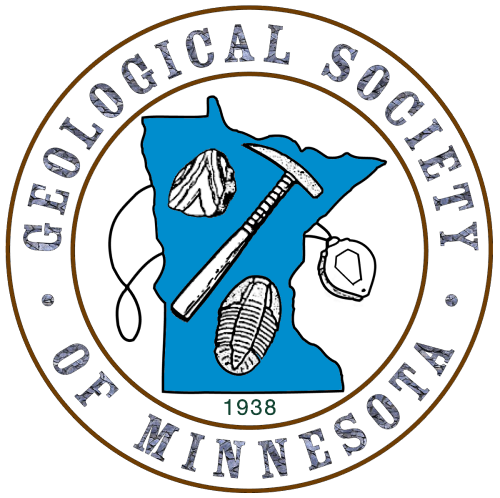Current Year Schedule
GSM seminars with slide show presentations are free and open to the public. They are presented by leading professionals in their fields and are aimed at learners from high school to adult. A question-and-answer session follows each seminar. The labs, also free and open to the public, allow a hands-on learning experience and demonstrate the ideas and principles of geology and earth science. Live lectures and labs require no registration; just show up a few minutes early on the evening of the lecture.
Click on date of any seminar for attendance information and other details. For a printable version of our schedule of seminars and labs, click here.
Except as noted, live lectures during fall 2024 are Mondays at 7:00 PM CT on the University of Minnesota campus, Keller Hall, Room 3-230. The address is 200 Union St. SE, Minneapolis MN. A lecture with (V) following its title is an online virtual lecture. For these, free registration is required by non-members; the instructions are supplied with the lecture description.
Our schedule is planned over 6 months in advance, so changes may occur. Always check this website shortly before each lecture for the latest seminar information.
Winter weather will come and snow might impact our lectures. The GSM will make any decision about cancelling or postponing a lecture due to inclement weather no later than 3:00 PM the day of the lecture. This information will be posted on the GSM home page (http://www.gsmn.org/). So check our home page shortly before each lecture in case there is a cancellation or a last-minute change. Also, we will e‐mail lecture postponement and cancellation information to our members.
Past seminars marked with * were recorded and the recording is available on the Geological Society of Minnesota YouTube channel. Subscribe to this channel for updates.
Seminar Details
Seminar Lab Date: February 24, 2025
Seminar Lab Subject: GREATEST MASS EXTINCTIONS IN EARTH’S HISTORY (V)
Seminar Lab Presenter: RACHEL PHILLIPS, PH.D., (GEO GIRL), POSTDOCTORAL RESEARCHER AND INSTRUCTOR, U. OF SOUTH CAROLINA
Seminar Lab Location:
Virtual lecture 7:00 PM CT.
Participation instructions will be e-mailed to GSM members. If you are not a member of GSM and wish to attend this free seminar online, register as follows by 8 AM CT Monday, Feb 24: Go to the Contact menu above and select “Ask GSM”. In the form that appears, enter your name and e-mail address. Enter “Feb 24 lecture” in the subject line. In the message body, please enter the city and state or country from which you will view the seminar. You will receive instructions by e-mail prior to the lecture. Check your spam folder if the instructions do not appear in your in-box at least one hour prior to the lecture.
Seminar Lab Detail:
Summary: Most people know about the mass extinction that took out the dinosaurs 66 million years ago. However, a lot of people are unaware of the other significant mass extinction events in Earth’s past that have shaped biological evolution. In this talk, I will cover the 5 largest mass extinctions of all time; specifically, what caused them, what effects they had on life, and what we can learn from them.
Biography: Rachel Phillips is an NSF Postdoctoral Researcher and Instructor at the University of South Carolina. She received her Ph.D. in Geological Sciences from the University of Texas at El Paso, where her research was aimed at improving reconstructions of Earth’s ancient atmospheric and oceanic conditions. Her current postdoctoral research is focused on increasing geoscience enrollment and engagement through identifying and transforming misperceptions of geoscience. Alongside her research, Rachel works to promote global inclusivity and engagement in the geosciences through her YouTube channel, GEO GIRL, on which she shares educational geoscience videos (channel link: https://www.youtube.com/@GEOGIRL; website link: geogirlscience.com). Having posted about 300 videos with over 3.5 million views from around the globe, Rachel has made significant progress toward improving the accessibility and perceptions of geoscience.
